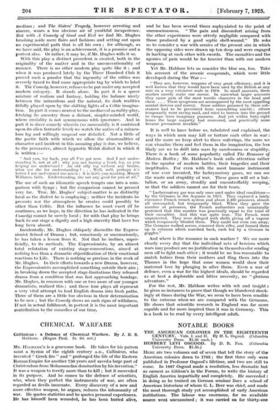CHEMICAL WARFARE
Callinicus : a Defence of Chemical Warfare. By J. B. S. Haldane. (Kogan Paul. 2s. 6d. net.) Mn. HALDANE'S is a gruesome book. He takes for his patron saint a Syrian of the eighth century A.D., Callinicus, who invented" Greek fire" and " prolonged the life of the Eastern Roman Empire for another 750 years and saved a large part of Christendom from Mohammedan domination by his invention." It was a weapon to terrify more than to kill ; but it succeeded in its purpose. And he comes to the defence of scientists, who, when they perfect the instruments of war, are often regarded as devils incarnate. Every discovery of a new and more effective weapon, he argues, reduces the inhumanity of war. He quotes statistics and he quotes personal experiences. He has himself been wounded, he has been buried alive.,
and he has been several times asphyxiated to the point of unconsciousness. "The pain and discomfort arising from the other experiences were utterly negligible compared with those produced by a good septic shell-wound." He asks us to consider a war with armies of the present size in which the opposing sides were drawn up ten deep and were engaged in hacking at each other with swords. The casualties and the agonies of pain would be far heavier than with our modern weapons.
Yet Mr. Haldane lets us consider the blue sea, too. Take his account of the arsenic compounds, which were little developed during the War :—
"They are, however, weapons of very great efficiency, and it is well known that they would have been used by the British at any rate on a very extensive scale in 1919. In small amounts, these smokes merely make one sneeze. In somewhat larger amounts they cause pain of the most terrific character in the head and chest. . . . These symptoms are accompanied by the most appalling mental distress and misery. Some soldiers poisoned by these sub- stances had to be prevented from committing suicide ; others temporarily went raving mad, and tried to burrow into the ground to escape from imaginary pursuers. And yet within forty-eight hours the large majority had recovered, and practically none became permanent invalids."
It is well to have before us, tabulated and explained, the ways in which men may kill or torture each other in war : and the more we keep alert to those sufferings, the more we can visualize them and feel them in the imagination, the less likely are we to drift into wars by carelessness or stupidity. There is a book of some popularity called The Romance of Modem Battles ; Mr. Haldane's book calls attention rather to the squalor of modern battles, their tragedies and their
ineptitudes. For even with the most humane instrument of war ever invented, the laehrymatory gases, we can see the waste and stupidity of war. These gases will set a bat- talion, or an army, steadily and uncontrollably weeping,' so that the soldiers cannot see for their tears.
" Lachrymatory gas was only once used under ideal conditions— by the Germans in the Argonne in 1915. They captured a fairly. extensive French trench system and about 2,400 prisoners, almost all unwounded, but temporarily blind. When they gave the number of prisoners, the French authorities not unnaturally protested that this number was practically equal to the total oft their casualties. And this was quite true. The French were unprotected. They were deluged with shells giving off a vapour which temporarily blinded them. They could not even run away.: The Germans walked across, removed their rifles, and formed them up in columns which marched back, each led by a German in goggles."
And where is the romance in such warfare ? We see more clearly every day that the individual acts of heroism which, wars may produce are no justification in themselves for sending men off to fight each other ; it would be no less reasonable to snatch babies from their mothers and fling them into the Thames in the hope that some women would show their maternal love by plunging in after them. Even a war of defence, even a-war for the highest ideals, should be regarded as at best a deplorable and bitter necessity, no "glorious adventure."
For the rest, Mr. Haldane writes with wit and insight : he gives us instances to prove that though we blundered shock- ingly at times during the War, we seem to have been sensible to the extreme when we are compared with the Germans.
He shows that scientific research in England was far more capable and far more inspired than it was in Germany. This is a book to be read by every intelligent adult.










































 Previous page
Previous page